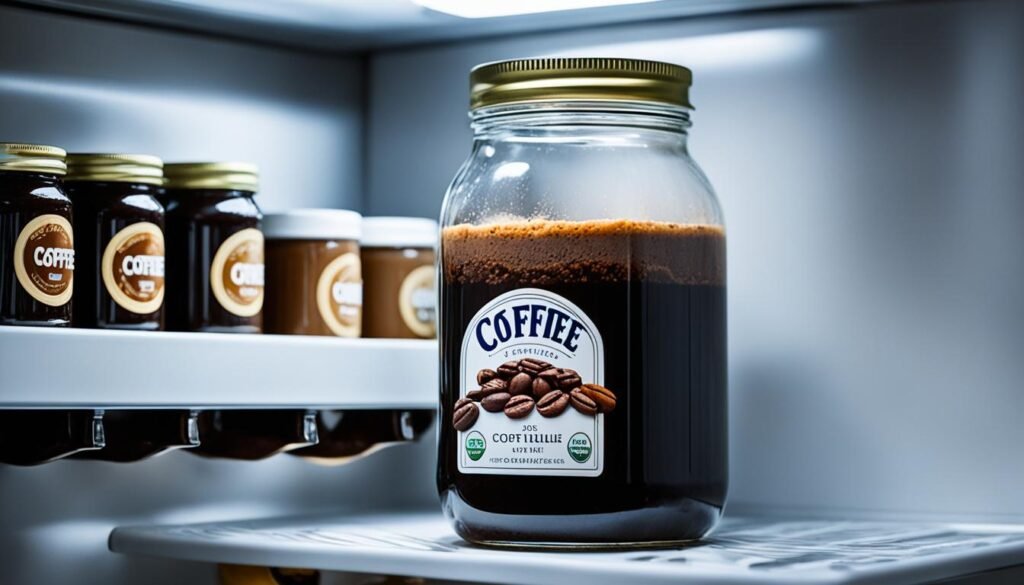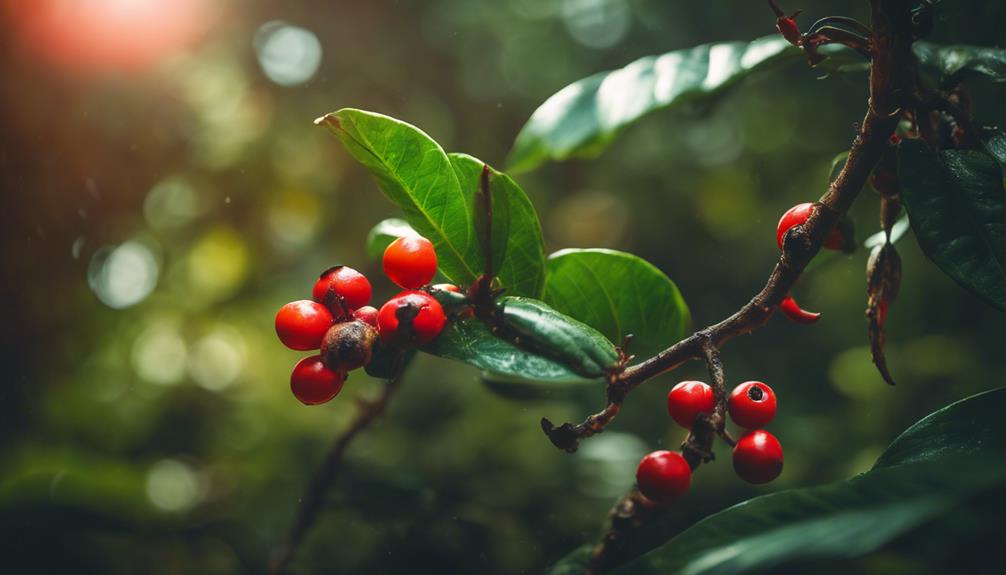Coffee grounds are a natural way to boost the growth of lemon trees by enriching the soil with nutrients like nitrogen, which aids in plant development and enhances water retention.
To make use of coffee grounds, let them cool down before mixing them with brown materials such as leaves to create a balanced compost mixture. It's important to store this mixture in containers with air holes to preserve its quality.
Allow the combination to decompose for about six months to break down any harmful substances, transforming it into humus. Once ready, incorporate this nutrient-rich compost into the soil around your lemon trees to promote better growth and overall health.
By following these steps, you can maximize the benefits of coffee grounds for your lemon trees.
Benefits of Coffee Grounds
Coffee grounds offer numerous benefits for enhancing soil fertility and promoting robust growth in lemon trees. Rich in nitrogen, these grounds support vigorous plant growth by improving soil structure, increasing aeration, and enhancing water retention.
They also contribute to the organic matter in the soil, fostering a healthy microbial community crucial for nutrient availability. Properly composted coffee grounds help balance soil pH, creating a conducive environment for lemon trees. It's essential to ensure thorough decomposition to avoid potential harm from residual chemicals.
Preparing Coffee Grounds
To make the most of coffee grounds for your lemon trees, it's crucial to prepare them properly through composting. Start by allowing the coffee grounds to cool down to prevent excess moisture, which can cause mold.
Then, mix the cooled coffee grounds with brown materials like leaves, hay, or bark chips. This blend helps balance the compost by adding essential carbon to complement the nitrogen-rich coffee grounds. Aim for a ratio of two-thirds brown materials to one-third green materials (coffee grounds).
Let the mixture decompose for about six months. This decomposition process is key as it breaks down any harmful chemicals, making the coffee grounds safe and beneficial for lemon trees. Well-prepared compost enriches the soil quality and supports the healthy growth of your trees.
Storing Coffee Grounds
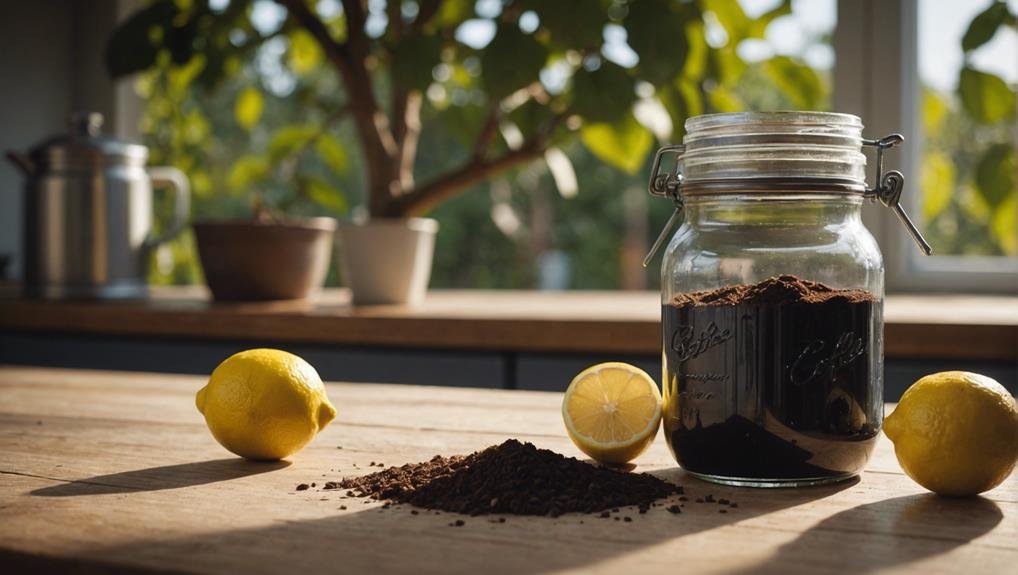
Storing coffee grounds properly is crucial to prevent mold growth and ensure their effectiveness for composting. Start by using a container with air holes to allow for ventilation, which helps prevent mold.
Make sure to let the coffee grounds cool before storing them, as hot grounds can trap moisture and promote mold growth. Opt for containers that are not airtight to avoid moisture buildup.
It's also a good idea to keep the coffee grounds separate until you're ready to mix them with other compost materials. By following these storage practices, you can maintain the quality of the coffee grounds and prepare them for the composting process, ultimately benefiting the health and growth of lemon trees.
Mixing With Brown Materials
Mixing coffee grounds with brown materials like leaves, hay, or bark chips is crucial for creating well-balanced compost for lemon trees. This blend ensures the right carbon-to-nitrogen ratio, which is key for efficient decomposition and nutrient availability.
Brown materials provide carbon, while coffee grounds add nitrogen, promoting a healthy microbial environment. To achieve optimal results, use a garden fork to thoroughly combine the components, keeping a ratio of roughly two-thirds brown materials to one-third green materials, including coffee grounds.
Moreover, incorporating food scraps and grass clippings can enrich the compost's nutrient content. This balanced mix not only speeds up the composting process but also yields a nutrient-rich amendment that supports robust lemon tree growth.
Decomposition Timeline
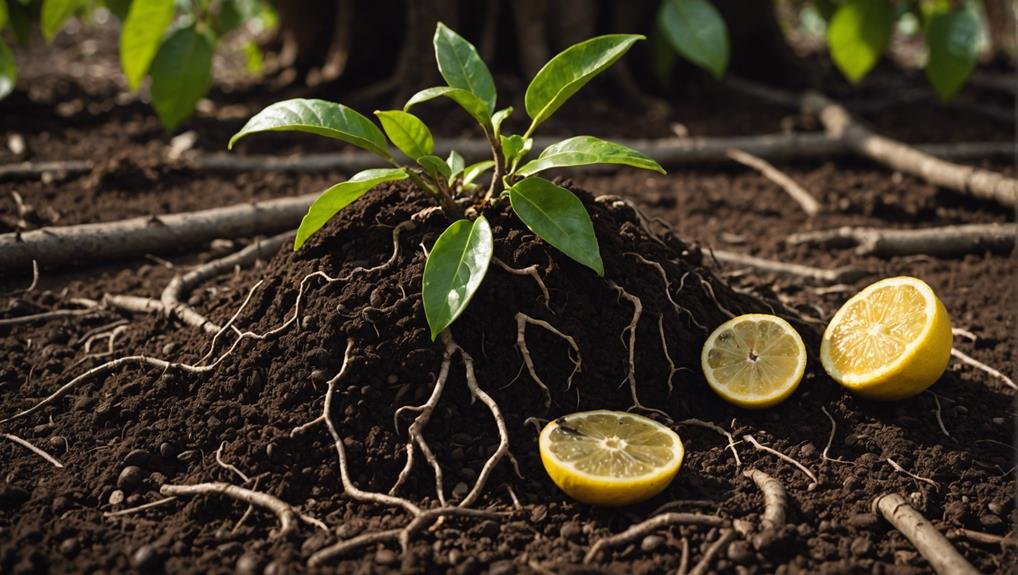
In order to ensure that coffee grounds and brown materials become a safe and effective nutrient source for lemon trees, it is crucial to allow them to decompose for a period of six months. This timeline is essential for the breakdown of any potentially harmful chemicals present in the coffee grounds.
Over the six-month period, microbial activity works to convert the mixed organic materials into humus, a nutrient-rich substance. This process not only helps neutralize any remaining caffeine and other compounds but also improves the soil structure.
The decomposition period plays a vital role in creating a balanced compost that can be easily absorbed by lemon trees. Well-decomposed coffee grounds contribute to healthier soil, supporting strong tree growth and fruitful production. Practicing patience during this process is key to achieving the best results.
Application to Lemon Trees
Once the coffee grounds and brown materials have decomposed for six months, they are ready to be applied to lemon trees to improve soil quality and support healthy growth.
To effectively use composted coffee grounds:
- Top Dressing: Gently spread a thin layer of compost around the tree's base, making sure to avoid direct contact with the trunk.
- Soil Amendment: Mix the compost into the soil to enhance aeration and nutrient levels.
- Mulching: Utilize the compost as mulch to retain moisture in the soil and prevent weed growth.
- Liquid Fertilizer: Create a nutrient-rich liquid feed by steeping the compost in water.
Sustainable Gardening Practices
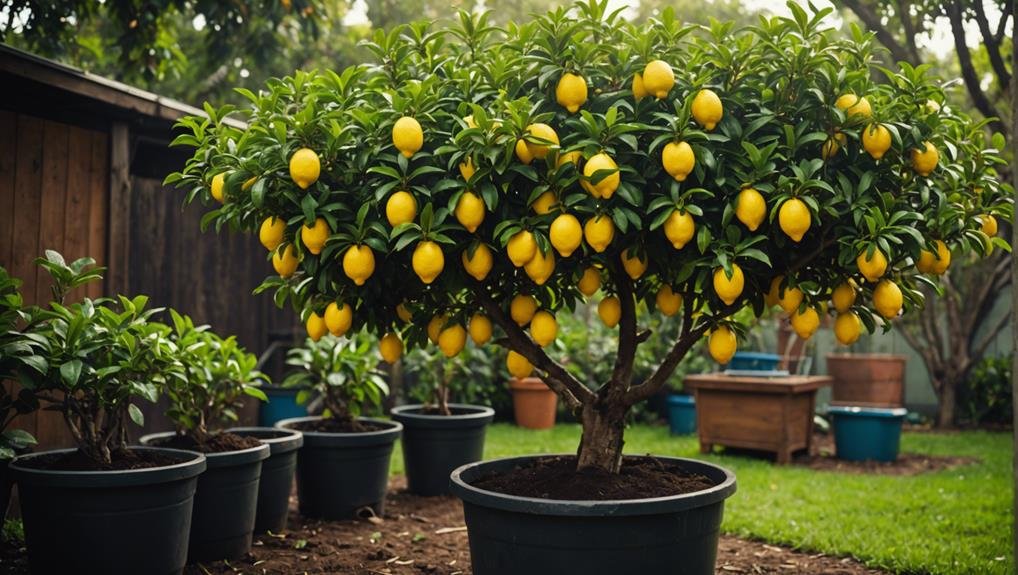
Maintaining the health of your lemon trees and the ecosystem around them is essential through sustainable gardening practices. Using organic materials and reducing chemical use creates a balanced environment that supports growth and resilience. Composting coffee grounds enriches the soil with nutrients, improves its structure, retains water, and provides essential elements. Here's a breakdown of sustainable gardening practices compared to conventional methods:
| Practice | Sustainable Gardening | Conventional Gardening |
|---|---|---|
| Soil Enrichment | Composting | Chemical Fertilizers |
| Pest Control | Natural Predators | Pesticides |
| Water Management | Drip Irrigation | Overhead Sprinklers |
| Weed Control | Mulching | Herbicides |
Adopting these sustainable practices ensures a healthier garden and supports a thriving ecosystem.
Conclusion
In essence, composting and using coffee grounds can be compared to nurturing a lemon tree with a natural boost, turning waste into a valuable resource that enriches the soil and enhances the tree's health.
By following proper composting techniques, coffee grounds can serve as a sustainable and efficient fertilizer, encouraging robust growth and higher fruit production.
This approach not only benefits lemon tree productivity but also aligns with eco-friendly gardening practices, emphasizing the significance of sustainable resource management.








